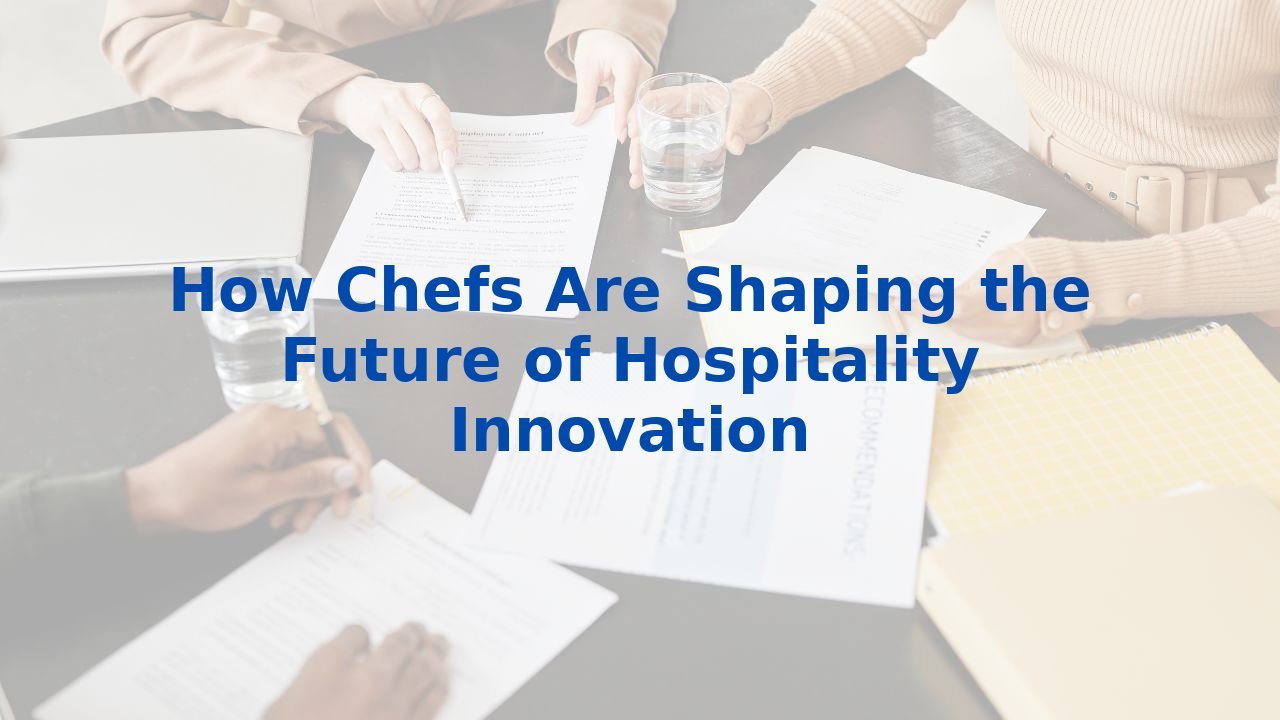How Chefs Are Shaping the Future of Hospitality Innovation
Leading the Way Forward: The Chef's Role in Hospitality Innovation
In an industry known for its vibrancy and dynamism, chefs are emerging as the trailblazers of hospitality innovation. They are not just culinary artists but also visionaries who embrace creativity, strategic thinking, and technological advancements to redefine the hospitality landscape. This evolution paves the way for a more sustainable future and personalized guest experiences, ensuring that the heart of hospitality beats stronger than ever.
The Chef as Innovator
Chefs are uniquely positioned to influence change within the hospitality industry. By leveraging their creativity, they challenge conventional norms and explore new avenues for innovation. From implementing eco-friendly practices to utilizing cutting-edge technology, chefs can intertwine their culinary expertise with advancements in sustainability.
For instance, a commitment to sourcing local and organic ingredients not only enhances the guest experience but also promotes environmental stewardship. As the demand for transparency in sourcing grows, chefs who embrace these innovative practices can significantly impact their establishments’ reputations and profitability.
Technology and the Future of Hospitality
In an era dominated by rapid technological advancement, the culinary world is no exception. Technology is reshaping how chefs create and deliver culinary experiences. The integration of artificial intelligence (AI) has opened new avenues for enhancing operational efficiency and enhancing guest satisfaction.
AI can analyze customer data to tailor dining experiences, optimizing menus based on preferences and past behaviors. This not only fosters a more personalized environment but also streamlines inventory management, reducing food waste by predicting demand more accurately. Chefs can focus on creating exceptional dishes while AI handles the logistical intricacies, allowing for a smoother flow in the kitchen.
The Power of Personalization
Personalized guest experiences form the backbone of modern hospitality. By leveraging technology and data analytics, chefs can transcend the traditional dining experience. Imagine the impact of a restaurant remembering guests’ favorite dishes, dietary restrictions, or even past interactions. This personalized approach fosters a deeper connection with diners, encouraging loyalty and repeat visits.
Furthermore, the use of AI tools enables chefs to create detailed profiles of their guests, helping them anticipate preferences and enhance the overall dining experience. This level of attentiveness not only improves customer satisfaction but can also drive sales through targeted upselling and unique offerings designed for individual tastes.
Capacity for Sustainability
Sustainability is no longer just a buzzword; it’s a fundamental principle for the future of hospitality. Chefs can become champions of sustainable practices through innovations in technology. The adoption of AI-driven systems can lead to informed decisions regarding ingredient usage, waste management, and energy consumption.
For example, resource allocation becomes more efficient with AI, helping kitchens use resources intelligently and promote responsible consumption. This dedication to sustainability can enhance a restaurant’s brand image and appeal to increasingly eco-conscious consumers who seek culinary experiences aligned with their values.
Training Employees for the AI Age
While technology is undoubtedly a catalyst for innovation, the human element remains irreplaceable. Investing in the training of chefs and kitchen staff in AI technology elevates an organization’s overall capability. Empowered employees can harness the power of AI, transforming insights into action to streamline processes and enhance the guest experience.
Training not only improves efficiency but also fosters a culture of continuous learning and adaptation, which is essential in today’s fast-paced environment. By equipping your workforce with the skills necessary to navigate AI tools effectively, your organization will be well-prepared to meet the challenges and opportunities of the future.
Conclusion: Embracing Change
The hospitality industry stands on the brink of a transformative journey, with chefs leading the way. Their ability to adapt, innovate, and embrace technology is shaping the future of dining and hospitality. By leveraging creativity, sustainability, and advanced technologies like AI, chefs have the opportunity to create memorable and personalized experiences for every guest.
As we look forward, it is clear that those who dare to innovate will be the ones who thrive. The promise of an enriched hospitality landscape is bright, and with chefs at the helm, the future holds endless possibilities. Together, let’s continue pushing the boundaries of what’s achievable and champion the transformational power of hospitality.
By embracing change and fostering creativity, we are not just preparing for the future; we are shaping it.



